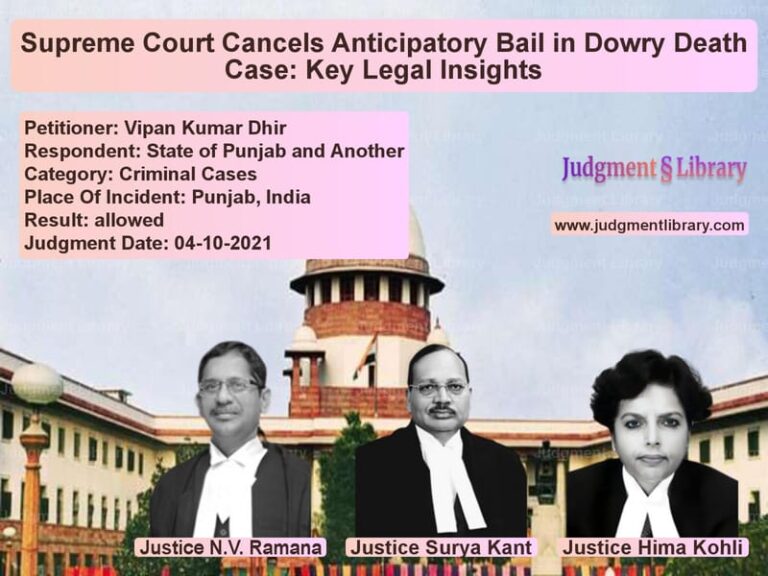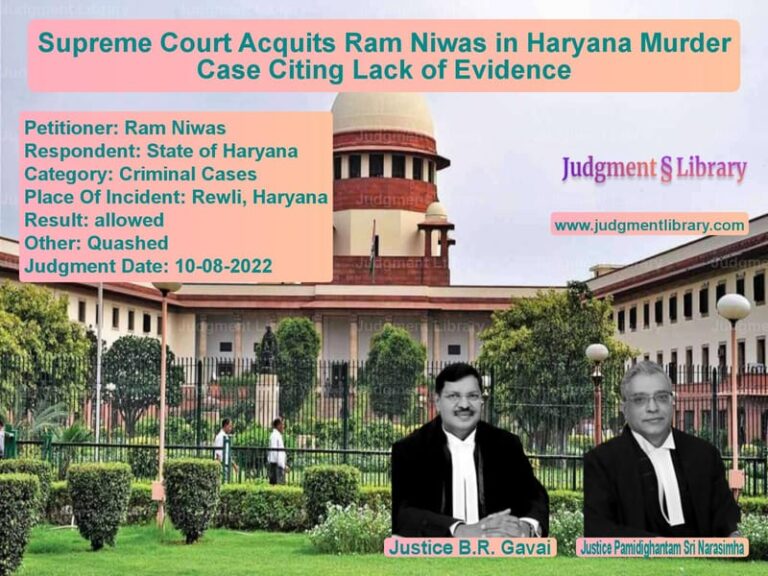Child Custody and Visitation Rights: Supreme Court Ruling in Manoj Anslem Rebeiro vs. Candace Elizebath Rebeiro
The Supreme Court of India recently delivered a significant judgment in Manoj Anslem Rebeiro vs. Candace Elizebath Rebeiro, dealing with the critical issue of child custody and visitation rights. The case involved a dispute over whether the father, the appellant, should be granted visitation rights to meet his minor daughter, Marileine Amanda Rebeiro, despite a highly strained relationship with the child’s mother.
Background of the Case
The dispute arose when the appellant, Manoj Anslem Rebeiro, approached the Supreme Court, seeking visitation rights to meet his minor daughter, who was in the custody of the respondent, Candace Elizebath Rebeiro. The High Court had earlier denied the father visitation rights, citing the highly acrimonious nature of the case.
The appellant contended that as a biological parent, he had the fundamental right to meet and interact with his daughter. The respondent, on the other hand, argued that allowing visitation could negatively impact the child due to past conflicts between the parents.
Supreme Court’s Observations
The Supreme Court, comprising Justice Kurian Joseph and Justice Rohinton Fali Nariman, noted that while the parental conflict was severe, it should not become a reason to completely deny a parent access to their child. The Court stated:
“Having heard the learned counsel on both sides, we find that whatever be the background of the case, it cannot be so acrimonious so as to deny the right of the father to see his daughter.”
Final Judgment and Directions
Considering the best interests of the child, the Supreme Court issued the following directives:
1. Granting Visitation Rights
- The respondent, Candace Elizebath Rebeiro, was directed to produce the minor child, Marileine Amanda Rebeiro, in the Family Court, Thiruvananthapuram, on the third Saturday of every month at 11:00 AM.
- The child would be allowed to interact with the father until 01:00 PM.
2. Supervised Visitations
- Considering the estranged relationship between the parents, the Court ruled that the meeting should take place within the premises of the Family Court.
- The father shall not be allowed to take the child outside the court premises during the visitation.
3. Grandparents’ Presence Permitted
- The Supreme Court allowed the paternal grandparents of the child to accompany the father during the visitation.
- This provision was made to provide emotional comfort to the child while ensuring a meaningful family connection.
Implications of the Judgment
This ruling carries several crucial implications for child custody and parental rights in India:
1. Affirmation of the Right to Visitation
The Supreme Court’s ruling affirms that, except in cases of proven harm or abuse, a biological parent has a fundamental right to meet their child. This decision reinforces the judiciary’s stance that children benefit from the presence of both parents in their lives.
2. Supervised Visitation to Protect the Child
By requiring the meetings to take place under the supervision of the Family Court, the judgment ensures that the interaction remains positive and does not escalate into conflicts between the parents. This directive prioritizes the emotional well-being of the child.
3. Grandparents’ Role in Child Custody Disputes
By allowing grandparents to be present during visitation, the Court acknowledged the extended family’s role in a child’s upbringing. This aspect of the ruling ensures that the child maintains a connection with paternal relatives, which is often a concern in custody disputes.
4. Balance Between Parental Rights and Child’s Best Interests
The ruling strikes a delicate balance between ensuring a father’s right to visitation and safeguarding the child’s mental and emotional stability. The decision prevents alienation of the child from the non-custodial parent while maintaining necessary protective measures.
Conclusion
The Supreme Court’s ruling in Manoj Anslem Rebeiro vs. Candace Elizebath Rebeiro underscores the importance of preserving a child’s relationship with both parents, even in cases of acrimonious separations. The Court ensured that the father could meet his daughter while implementing measures to protect the child’s emotional well-being.
This judgment serves as a landmark case in child custody disputes, reinforcing the principle that a parent’s right to visitation should not be denied solely due to conflicts between the parents. The ruling sets an important precedent for similar cases, ensuring that children’s rights and well-being remain the primary consideration in custody disputes.
Don’t miss out on the full details! Download the complete judgment in PDF format below and gain valuable insights instantly!
Download Judgment: Manoj Anslem Rebeiro vs Candace Elizebath Re Supreme Court of India Judgment Dated 09-05-2016-1741860894175.pdf
Direct Downlaod Judgment: Direct downlaod this Judgment
See all petitions in Child Custody
See all petitions in Judgment by Kurian Joseph
See all petitions in Judgment by Rohinton Fali Nariman
See all petitions in allowed
See all petitions in supreme court of India judgments May 2016
See all petitions in 2016 judgments
See all posts in Divorce Cases Category
See all allowed petitions in Divorce Cases Category
See all Dismissed petitions in Divorce Cases Category
See all partially allowed petitions in Divorce Cases Category







